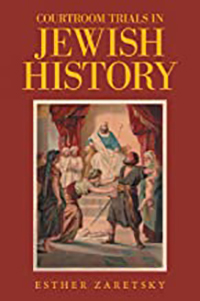Courtroom Trials in Jewish History, Esther Zaretsky, Xlibris, Bloomington, IN, ©2021, ISBN 978-1-6641-6475-8, p. 98, plus suggested readings, $16.99.
By Fred Reiss, Ed.D.

 WINCHESTER, California – In Courtroom Trials in Jewish History, attorney and Jewish-community activist Esther Zaretsky offers an eclectic collection of stories about Jews who, in a broad sense, have had their day in court, courts representing justice at its worst, verdicts driven by antisemitism and anti-Israeli hatred. The title is somewhat of a misnomer, as there are no depositions or testimonies; no exhibits or closing arguments. Rather, Zaretsky provides the backstory leading up to the trial, the verdict, emphasizing how the “courts fail to affirm society’s most precious values of justice, equality, morality, and the preservation of human rights,” and its aftermath—we get to hear the rest of the story.
WINCHESTER, California – In Courtroom Trials in Jewish History, attorney and Jewish-community activist Esther Zaretsky offers an eclectic collection of stories about Jews who, in a broad sense, have had their day in court, courts representing justice at its worst, verdicts driven by antisemitism and anti-Israeli hatred. The title is somewhat of a misnomer, as there are no depositions or testimonies; no exhibits or closing arguments. Rather, Zaretsky provides the backstory leading up to the trial, the verdict, emphasizing how the “courts fail to affirm society’s most precious values of justice, equality, morality, and the preservation of human rights,” and its aftermath—we get to hear the rest of the story.
The book seems to be divided into two parts, the first holding nine “trials” presented in chronological order beginning with French Captain Alfred Dreyfus in the late nineteenth century, then continuing with other Jewish notables such as, Menachem Mendel Beilis, Leo Frank, Julius and Ethel Rosenberg, and Jonathan Jay Pollard. Zaretsky even includes the investigation by Israel’s Kahan Commission to determine Defense Minister Ariel Sharon’s culpability in the massacre of defenseless civilians during a June, 1982 military operation in Lebanon’s Baka’a Valley, and his subsequent libel trails with Time, Inc. in American and Israeli courts.
In the second part, holding two chapters describing the trials of biblical characters, Zaretsky departs from civil-court cases, illustrating how God and Jewish wisdom mete out justice. The first of the two chapters recounts the “trials” of Adam and Eve, Cain and Abel, Sodom and Gomorrah, the binding of Isaac, and a judicial ruling by King Solomon, underscoring God’s and Judaism’s adherence to the Deuteronomic imperative, “Justice, justice shall you pursue.”
In the second of the two chapters, entitled “The Trial of Jesus,” Zaretsky pieces together the events leading up to the trial, proceedings, and subsequent verdict by relying on the synoptic gospels, which are, unfortunately, hearsay evidence since the authors are actually unknown and written decades after the events. Additionally, there are facts in dispute. The Talmud (Sanhedrin 43a), for instance, states Jesus died by stoning and subsequently hung from a tree; it also says Jesus had only five disciples. Who really knows what happened?
The chapters in part one of Courtroom Trials in Jewish History are not written to be episodes of the famous TV court drama Law and Order, nor should they be. They are engaging, enlightening and thought-provoking accountings of political and social factors before, during and after the specified trials, revealing the persistent antisemitism spanning two centuries and across two continents. Arguably more important, many chapters confirm the American judicial system is at times a weak shield against antisemitism, raising the frightening thought that they must be equally impotent against xenophobic and White-nationalistic forces hellbent on homogenizing the country.
*
Fred Reiss, Ed.D. is a retired public and Hebrew school teacher and administrator. His newest book is The Jewish Calendar: History and Inner Workings, Fourth Edition. He may be contacted via fred.reiss@sdjewishworld.com.